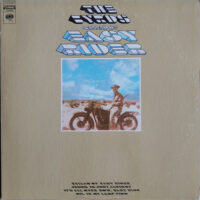
Unless you’re a staunch contrarian, your favorite Byrds album is probably one of the six that was released between 1965 (Mr. Tambourine Man) and 1967 (Sweetheart Of The Rodeo). But post-1967 Byrds—with Roger McGuinn often the lone original member left in the lineup—had some strong albums, too. My favorite of the bunch is Ballad Of Easy Rider, which, as most fans know, has little to do with the wonderful counterculture film Easy Rider… except for McGuinn’s title track and the fact that one of its stars, Peter Fonda, wrote the LP’s liner notes.
The personnel for Easy Rider included drummer/banjoist/guitarist Gene Parsons, bassist John York, lead guitarist Clarence White, and guitarist/synthesist Roger McGuinn, with all members singing. Terry Melcher and Jerry Hochman produced. Perhaps helped by its association with the Easy Rider movie, the album peaked at #36 on the Billboard albums chart and the singles “Ballad Of Easy Rider” and “Jesus Is Just Alright” had some commercial success, although not on the level of “Mr. Tambourine Man” or “Turn! Turn! Turn!”
Speaking of “Ballad Of Easy Rider,” this McGuinn composition differed from the version that appeared in the Dennis Hopper film. That one only featured Roger on guitar and vocals and Gene Parsons on harmonica. This one had the whole band contributing, with orchestral elements added at Melcher’s suggestion. It has the flowing, bucolic bliss of “Goin’ Back” off The Notorious Byrd Brothers. Trivia: Dylan contributed the opening line (“The river flows, it flows to the sea/Wherever that river goes, that’s where I want to be/Flow, river, flow,” scribbled on a napkin that he gave to Fonda), but he demanded that his songwriting credit be nixed, because of his dislike of the film. Originally performed by Art Reynolds Singers, the Byrds’ “Jesus Is Just Alright” wasn’t as successful as the Doobie Brothers’ souped-up, percussion-heavy version with unison vocals, but they really lean into this inspirational gospel-rocker, so that even atheists can appreciate it.
Of the two traditionals arranged by the Byrds, “Oil In My Lamp” is a gorgeous, solemn tune with lovely vocal harmonies while “Jack Tarr The Sailor” is a stilted sea shanty that I could live without. The two country covers fare slightly better. The Pamela Polland-penned “Tulsa County” is a ballad that gently tugs the heartstrings, buoyed by White’s delicate, intricate acoustic-guitar tapestries. “There Must Be Someone”—written by Vern Gosdin—is a spare, heart-melting ballad that even this non-lover of country music can enjoy.
On “Gunga Din,” Parsons proved he could write a sweet-natured rambler in the vein of Fred Neil’s “Everybody’s Talkin’,” and sing it with hearty tenderness, too. And on the Dylan classic “It’s All Over Now, Baby Blue,” the Byrds slowed the tempo for greater poignancy—plus, the vocal harmonies and White’s sighing pedal steel sway this version into the W column.
Lo and behold, my favorite song on Easy Rider is McGuinn’s least favorite: “Fido.” Composer York based its structure on Dylan’s “The Mighty Quinn,” but with its excellent extended drum/percussion break (the only drum solo in the Byrds’ catalog), “Fido” sounds like a shoe-in for the next volume in Light In The Attic’s Country Funk series. I mean, it’s the Byrds’ second-funkiest cut after “Captain Soul,” but McGuinn thought it shouldn’t even be considered a Byrds song, because York, a “lowly” bassist, sang on it. Sorry, Rog—this track rules and you sound like a whiny bore. I think were Peter Fonda alive, he would agree with me here. -Buckley Mayfield
Located in Seattle’s Fremont neighborhood, Jive Time is always looking to buy your unwanted records (provided they are in good condition) or offer credit for trade. We also buy record collections.


